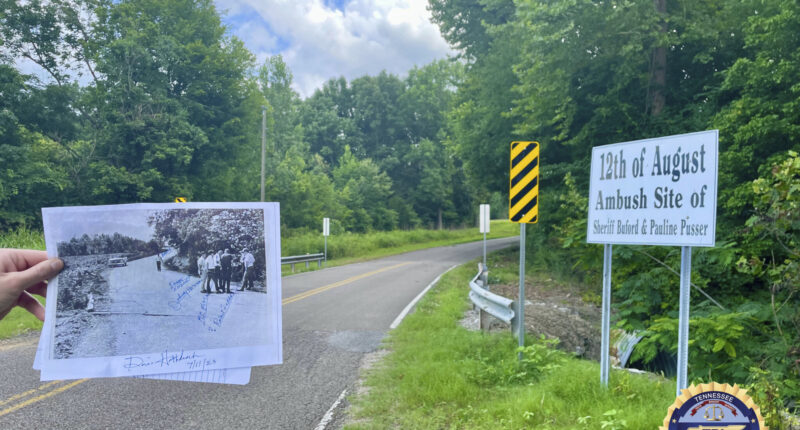Share this @internewscast.com
MCNAIRY COUNTY, Tenn. — A late Tennessee sheriff, famously portrayed in a Hollywood film for his battle against organized crime, is now believed to have killed his wife in 1967, misleading many to think that she was murdered by adversaries, as announced by authorities on Friday.
The revelation is expected to startle those who admired Buford Pusser, depicted in the 1973 movie “Walking Tall” as a relentless but just lawman with no tolerance for crime. The film inspired a 2004 remake, leading many to join law enforcement because of his story, noted Mark Davidson, the district attorney for Tennessee’s 25th judicial district.
Evidence suggests that if Pusser, who lost his life in a car accident seven years after his wife’s passing, were alive today, he would likely face charges by a grand jury for the murder of Pauline Mullins Pusser, Davidson explained. Investigations also revealed indications of domestic abuse she endured.
In collaboration with the Tennessee Bureau of Investigation, prosecutors reopened the cold case files regarding Pauline’s death in 2022, as part of routine reviews, mentioned agency director David Rausch. Discrepancies emerged between Pusser’s account and physical evidence, prompting them to consider a new lead on a possible murder weapon and to exhume Pauline’s body for an autopsy.
“This case is not about dismantling a legend. It’s about honoring Pauline and her family’s dignity, ensuring the truth survives time,” Davidson stated during an online news briefing. “Truth and justice are crucial, even after 58 years. Pauline’s memory deserves both.”
Evidence does not back up sheriff’s story
The incident traces back to August 12, 1967. Buford Pusser claimed he received an early morning call about a disturbance, with his wife volunteering to accompany him. Shortly after passing New Hope Methodist Church, Pusser reported that gunfire erupted from another car, fatally wounding Pauline and injuring him. Pusser spent 18 days hospitalized, undergoing several surgeries. The case was swiftly closed, almost entirely based on his own testimony, according to Rausch.
During the reexamination of the case, Dr. Michael Revelle, an emergency medicine physical and medical examiner, studied postmortem photographs, crime scene photographs, notes made by the medical examiner at the time and Buford Pusser’s statements. He concluded that Pauline was more likely than not shot outside the car and then placed inside it.
He found that cranial trauma suffered by Pauline didn’t match crime scene photographs of the car’s interior. Blood spatter on the hood outside the car contradicted Buford Pusser’s statements. The gunshot wound on his cheek was in fact a close-contact wound and not one fired from long range, as Buford Pusser described, and was likely self-inflicted, Revelle concluded.
Pauline’s autopsy revealed she had a broken nose that had healed prior to her death. Davidson said statements from people who were around at the time she died support the conclusion that she was a victim of domestic violence.
Brother says investigation gave him closure
Pauline’s younger brother, Griffon Mullins, said the investigation gave him closure. He said in a recorded video played at the news conference that their other sister died without knowing what happened to Pauline and he is grateful he will die knowing.
“You would fall in love with her because she was a people person. And of course, my family would always go to Pauline if they had an issue or they needed some advice and she was always there for them,” he said. “She was just a sweet person. I loved her with all my heart.”
Mullins said he knew there was some trouble in Pauline’s marriage, but she wasn’t one to talk about her problems. For that reason, Mullins said he was “not totally shocked.”
Asked about the murder weapon and whether it matched autopsy findings, Rausch recommended reading the case file for specifics.
The Tennessee Bureau of Investigation plans to make the entire file, which exceeds 1,000 pages, available to the public by handing it over to the University of Tennessee at Martin once it finishes with redactions. The school will create an online, searchable database for the case. Until then, members of the public can make appointments to review it in person or can purchase a copy, said university Chancellor Yancy Freeman Sr.
Copyright © 2025 by The Associated Press. All Rights Reserved.

















